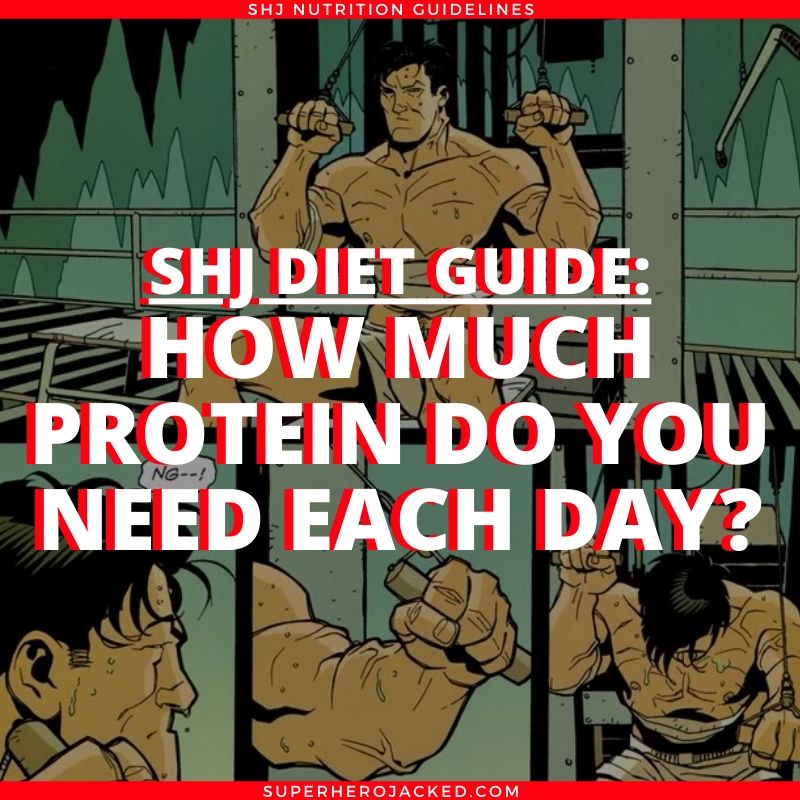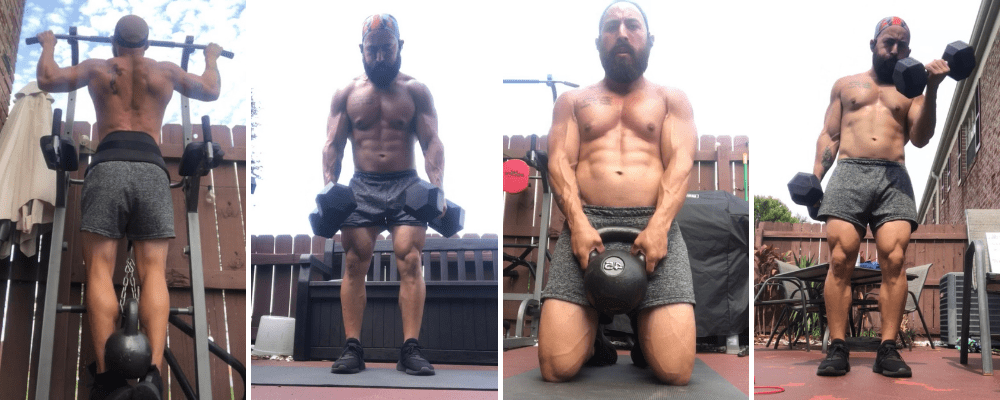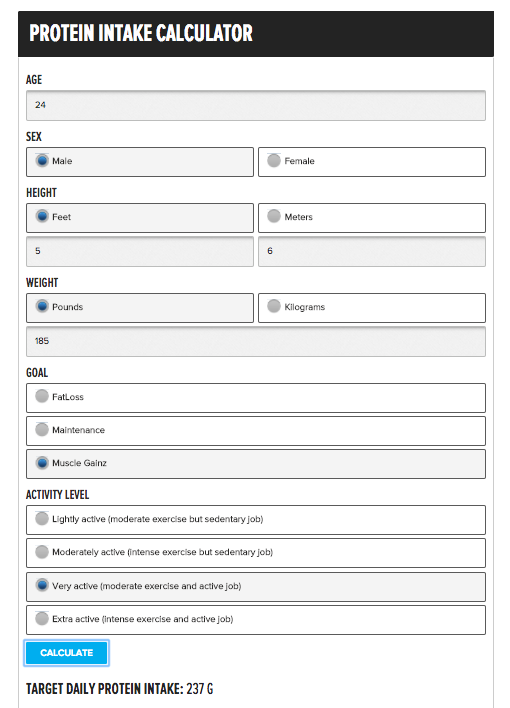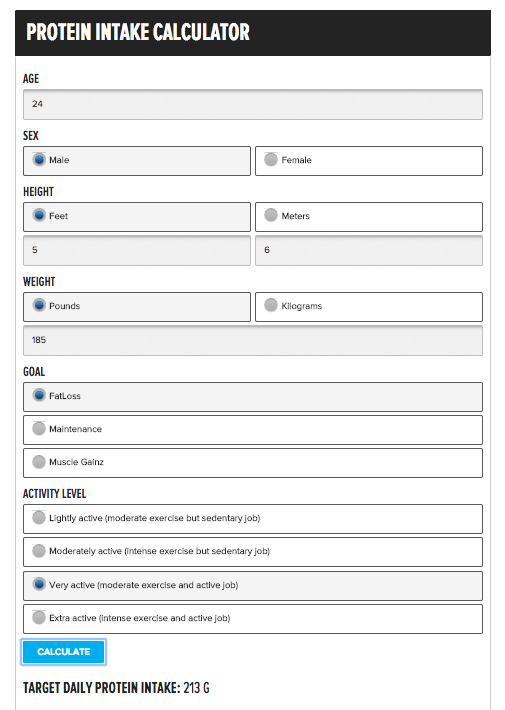Last updated on December 18th, 2021 at 08:07 pm

Before I go on this big long craze on protein – ROAR PROTEIN! – we should probably stop and talk about what it is and WHY we need it everyday.
Everyone needs it. It’s not just meatheads.
*Insert Meathead Joke Here*
Okay okay, can we get serious please?
I have done research on over 300 celebrities and even wrote a book on it called Superhuman Secrets where I break down countless case studies about their training and nutrition.
That said, I also break down some of The Top Diets Used Among Celebrities in this article – and one of the top diets utilized on that list is by male celebrities and athletes, which I refer to as “[Strict] High Protein]”.
And, if you read the article (or my book) you’ll learn that strict refers to the tracking of overall daily intake – where-as the second diet on the list is utilized by females and I refer to it as “[Basic] Healthy Diet” because of their guidelines generally being much more lax to achieve their overall intake and tracking.
That said, we’re going to be breaking down a wide range of protein intake, including years of research and testing we’ve done to develop a three-level protein system (more on this later) – similar to the three levels we utilize with our [optional] fasting within our 4-Tier-Nutrition System.
Which, if you’re here for the 4-Tier Nutrition System we use at SHJ you should start by reading these other three articles, which are all part of it, in conjunction with the one you’re currently on!
You can take a full course on all of my research and a breakdown of our 4-Tier-Nutrition System, with much more depth than these articles (and our exclusive calculators, recipe index, fast food index, and more) within our Academy.
Alright, alright: but…what is protein?
Well, proteins are the main building blocks of our body, and therefore our muscle.
They’re used to make muscles, tendons, organs and skin.
But, that’s just me speaking, so let’s take a quote from some smarter people over at LiveScience (plus, I like their definition):
“Protein is a macronutrient that is essential to building muscle mass. It is commonly found in animal products, though is also present in other sources, such as nuts and legumes.”
And, while we’re speaking of our macro nutrients (being able to count them will help in the future), I’ll go ahead all let you know that the other macros are carbs and fats. Proteins and carbs are worth 4 calories per 1g and fats are worth 9.
Remember that for calorie counting purposes!
Alright, so protein sounds pretty important. I guess if I was..hm..trying to look like Ryan Reynolds, or Henry Cavill, or Dwayne Johnson or something, I should probably get a decent amount of them, eh?
Well, actually some sources say much different than others.
Let’s discuss.

The Low-End of Recommended Daily Protein
WebMD tells us this:
Adults in the U.S. are encouraged to get 10% to 35% of their day’s calories from protein foods. That’s about 46 grams of protein for women, and 56 grams of protein for men.
And in regards to those numbers they say this:
Most Americans get more than enough protein each day, and may be getting too much of this nutrient from animal sources, like meat, poultry, and eggs.
Although important in the diet, extra protein will not help you build more muscle or make you stronger. When you’re consuming too much of it, you’re probably taking in more calories and fat than your body needs.
Which is drastically different than many other sources will tell you when it comes to lifting weights and working out.
This very well could be because the average adult in the U.S. isn’t automatically considering one that is going to be actively looking to gain muscle or strength.
Let’s continue.
The Middle-End of Recommended Daily Protein
Before we even hit the Bodybuilding.com spectrum of recommended daily protein intake, we’ll take a look at what Men’s Fitness has to say:
If you’re aiming for the low end of what’s typically recommended which is .8 grams/kg of bodyweight. For a 180-pound guy that works out to a mere 66 grams of protein a day. Up that to 1 gram/kg (which is more in line with recommendations for fit guys) and you get about 82 grams of protein a day.
And they go on to speak of their protein study by saying:
That’s still not enough, according to the study. The data confirmed that higher protein diets help with weight-loss efforts, finding that subjects saw the best results with a diet of about 25% protein. They suggest 25-35 grams of protein per meal, which works out to 75-105 grams in a day—before any snacks.
I mean hell, if protein is going to not only help me gain muscle but also lose weight/fat…I’m with Arnold on this one!

The High-End of Recommended Daily Protein
I figured we could have some fun here.
I obviously never hold back any stats from you guys, so I decided to go to Bodybuilding.com’s Daily Protein Intake Calculator and see what they told me.
SPOILER ALERT: The Results were HIGH!!!
Let’s take a look at two of my result pictures:
On this first one I put in all my stats and listed my goal as MUSCLE GAINZ….ROAR!
Bodybuilding.com told me that my recommended daily protein intake was 237 grams.
SHEESH!
Don’t worry, it goes down…..a little….kinda…
Here’s the second pic when I chose “FatLoss” instead:
Okay, so same stats (for myself), including keeping myself at very active, the only thing that changed was my goal.
This time my daily protein intake is recommended at 213 grams!
Supplementing and Hitting Your Daily Protein Intake
I personally supplement anywhere from 0-50 grams of protein every single day.
If you are utilizing our 4-Tier-Nutrition System (or reading about it), you’ll notice that one of the 4-Tiers is “Daily Cheat Meals and Indulgences”, which allow us to eat what we love and include our favorite foods into our diet DAILY.
But, these an only be done once we’ve completed (or planned to complete) our two most important tier levels:
- Daily Caloric Intake (Under If Losing Weight, Over If Gaining Weight)
- Daily Protein Goal (Hit Or Go Over)
For example, if you’re looking to lose weight and you have to stay under 2,000 calories a day while eating 150g or protein (I’m making up numbers for this example), here’s how your cheat meals and indulgences could then be programmed in.
- Meal One: 500 Calories, 50g Protein
- Meal Two: 500 Calories, 50g Protein
- Meal Three: 250 Calories, 50g Protein (Protein Shake)
Now, from this example you’ve eaten 1250 calories and already hit your daily protein intake.
**Or, you’ve planned out these meals ahead of time and know you’re hitting your protein and only need 1250 calories**
So that would then mean you can eat 750 calories worth of “free calories” used towards daily indulgences, or whatever you’d like – being that you’ve already planned perfectly around your 4-Tiers.
You can read more about the cheat meals and indulgences in that article – but it’s worth re-hashing a bit considering supplementing protein is something you can do to free up more calories each day.
That said: I generally tell people that 50g per day is my personal limit on protein I will get from supplements – but some of our coaches up that a bit to 75-100g (they also have about 100 pounds on me at 185 – so they’re kind of behemoths) with an extra protein bar or cookie on top of the double scoop protein shake.
Within our 4-Tier-Nutrition System you’ll soon learn we revolve around 3 different ranges – after having tested much lower protein levels with hundreds of coaches and members of the years – and I tend to utilize the middle level.
You’ll learn more about those levels below, but for the sake of this section I’ll tell you we have:
- The Minimum
- The Sweet Spot
- The Superhuman
And I like to be within The Sweet Spot – unless one of my clients (or even myself) is working on entering some kind of competition (which is rare).
That means that I don’t necessarily need to supplement protein at all if my meals are going to range from 50-100g of protein.
For many people that’s not the case, though (that’s part of the reason I share my “go-to” meals within our SHJ Nutrition Course); and supplementing upwards of 50+g of protein is ideal for hitting your daily numbers.
So, at the end of the day: it’s your choice how much protein is good for YOU to supplement to hit your goals, free up your indulgences, and make progress in your transformation.

Vegetarian and Protein Intake
We have a lot of vegetarians within our Academy.
Our 4-Tier Nutrition System is built in a way that can accommodate ANY dietary restriction being added onto it.
We have members who utilize Keto or Paleo to help with epilepsy and we have Vegans and Vegetarians for moral or health reasons – and we love them all.
That said: our vegetarians tend to have a harder time hitting their protein goals – so I did a 30 day test to build my own diet of 150g of protein per day within a 2000 calorie diet.
I supplemented 50g of protein a day, ate a BIG egg and cheese omelette (you can obviously add your own preferred veges to that) which resulted in 50-100g of protein, and then also opted for Greek yogurt with fruits and protein granola (although there were tons of other options I could hit my last 25 or so grams per day with).
The key to hitting your daily protein goals while being vegetarian (I will admit it’s much harder if you’re vegan – my brother is) is supplementing and making sure you’re prioritizing 25-50g of protein per meal, even if it is a side to your main meal.
I encourage vegans and vegetarians to shoot for our level of “The Minimum” within our 4-Tier Nutrition System, but usually after a few months they are able to work their way up to “The Sweet Spot” with no trouble!

How Much Protein Can You Absorb In One Meal? (20g? 30g? 100g?)
This is a question I get a lot.
Somewhere along the line it began being said that your body can only absorb 30g of protein each sitting.
I want to preface this entire section with the fact that our 4-Tier Nutrition System includes [optional] intermittent fasting (in 3 easy levels to choose from) and I opt for the highest level of 16-18 hours of fasting per day. If it were true that your body can only absorb 30g of protein per sitting, I would surely not be able to take on and retain as much muscle as I do from our very minimal approach to training and nutrition.
With that said, we can also think about it from a different perspective for some people, but I will also share some sources.
Coach Syatt Fitness said it really well when asked “It it true your body can only absorb so much protein at one time or one meal?”:
“No. That is a myth.
Your body can and will absorb it all. The more you eat the longer it takes to digest, is all.
Think about it: if your bodies could only absorb a small amount per meal, humans would have never made it this far. It’s been a very brief period of time in which we have such easy access to food on a daily basis.”
And to source a much larger body of research done by Jeff Nippard (who I am a huge fan of, by the way), he did a full video on the breakdown of how much your body can absorb in one meal – which you can find here.
In the video Jeff says:
Well the true myth is that only 20 to 30 grams of protein can be absorbed. The word absorbed is the key player here. The key error. In reality, we have virtually an unlimited capacity to absorb amino acids from protein.”
And then he goes on to cite some sources, including his first one that he states:
“According to a 2009 paper on digestion and absorption: virtually all ingested protein is absorbed by healthy humans.”
He then goes on to talk about the terminology we use “absorption” and cite TONS of sources that see this level in levels all over the spectrum – eventually stating:
“Most of the research we’ve been looking at so far is based on acute measures of muscle protein synthesis; not long term trials investigating full scale muscle hypertrophy. So some would argue that it’s just a little too speculative to make any strong conclusions about a true protein ceiling.”
He then moves into a section that brings up the fact that intermittent fasters eat huge meals ranging from 75-100+g or protein in one sitting and says:
And I will admit, that in the real world this feeding schedule doesn’t really seem to affect their ability to add lean mass in any way. And, I think there’s some literature to support this idea as well. One intermittent fasting study from Soeters and colleagues found that consuming, on average, 101g of protein in one four hour eating window, versus a more conventional spread out eating window, resulted in no differences in lean mass preservation between the groups. And another paper found that consuming one meal per day with roughly 86g of protein actually showed improvements in body composition when compared to that protein being spaced out among multiple meals.
Now, that’s not to say that it’s BETTER to eat in large amounts of protein.
The point I’m trying to make here is: stop trying to make things more complicated than they need to be. Simple always wins.
I talk about this when it comes to our training methodology, our nutrition, and a lot of different aspects of life. That’s why I wrote the article titled: The Four Key Components of Your Transformation; which is an article I tell people is a must read when coming to SHJ.
The best way to get your daily protein intake in is to find the best way FOR YOU.

Our Recommendation for Daily Protein Intake
As you can tell for yourself, the recommended amount of protein that you need each day is quite varied. This is for multiple reasons, and obviously every single person is going to be different.
Now, as I mentioned above, we utilize 3 different levels of protein intake within our 4-Tier Nutrition System to make it extremely easy for members to work their way up and adhere to their own dietary restrictions that may be outside the realm of our system (vegan, vegetarian – for example).
Our Three Levels of Protein Intake Are:
- The Minimum
- The Sweet Spot
- The Superhuman
And, as I mentioned above: I tend to fall within The Sweet Spot.
We have tested these levels with thousands of members and coaches over the years – and came about them through my research into 300+ celebrities, athletes and the world’s top performers – and I’m confident in much lower ranges than we generally see recommended.
That said, if you’re not a member of our Academy or using our 4-Tier Nutrition System, as a SUPER simplified rule of thumb I’m going to recommend you intake .8-1g of protein per pound of body weight each day.
I’d rather you shoot higher than lower if we can’t utilize our specific calculators and tested numbers, which is how i came to this level.
What does that number look like?
Well, let’s take a look at my own daily intake as an example (based on my recommendation).
I weigh 185 lbs., as you’ve seen in the above pictures.
.8g per day would leave us around 148 (but we’re going to round up to 150g) and 1g would be the obvious 185.
So, each day I need to have 150-185g of protein.
Simple.
With that said, you should be combining this resource with our articles on calorie counting/tracking, cheat meals and indulgences, and even intermittent fasting if you want to use our complete 4-Tier Nutrition System.
It’s all here for free – but if you want to take the course, grab the full booklet, and get tons of resources, recipes, meals, snacks and more to help you out – you can also join us inside our Academy.
######
Mike Romaine
SHJ’s Nick Fury
Join The Superhero Academy and start unleashing your inner SuperHuman.

SUPERHUMAN SECRETS V.2
NOW UPDATED AND EXPANDED WITH A NEW SECTION & SEVEN BONUSES
USD$29 USD$14.95




Mike,
Just finished the book and trying to get everything figured now. I’m 6’0″ 265lbs; I’m looking to lose fat and build muscle. With your protein guidance…am I shooting for 1g per lb of current weight or goal weight? 265g of protein just seems like it would be a lot if I’m trying to also drop about 50 – 60lbs of fat.
We use three levels within our 4-Tier Nutrition System, as mentioned above. All are based on your current weight. 265g is definitely a lot – and may be overkill, but without our actual calcs to utilize the 1g per lb. is just a basis around our Level Two: The Sweet Spot. When you’re talking about 2500-3000 calories, it’s no longer that crazy. I easily hit 175 per day with 1700-2000 calories (I’m short, hence the low cutting numbers as well lol).
How would I go about your protein intake recommendation, but also track 35/35/30 with MFP?
With our 4-Tier Nutrition System (which you can find under the nutrition tab) you learn we let carbs and fats fall in place. The most important part is calories. That controls your weight loss/fat loss. Then comes protein. That allows us to ensure we’re losing fat and maintaining muscle (or building muscle). Fats and carbs can fall in place, and generally tend to do so fine. If the numbers are skewed a bit that’s fine, you’ll still lose fat. That’s how both low fat diets work for people AND low carb diets (it really come down to staying under your cals), but you don’t see any “low protein” diets! 😛